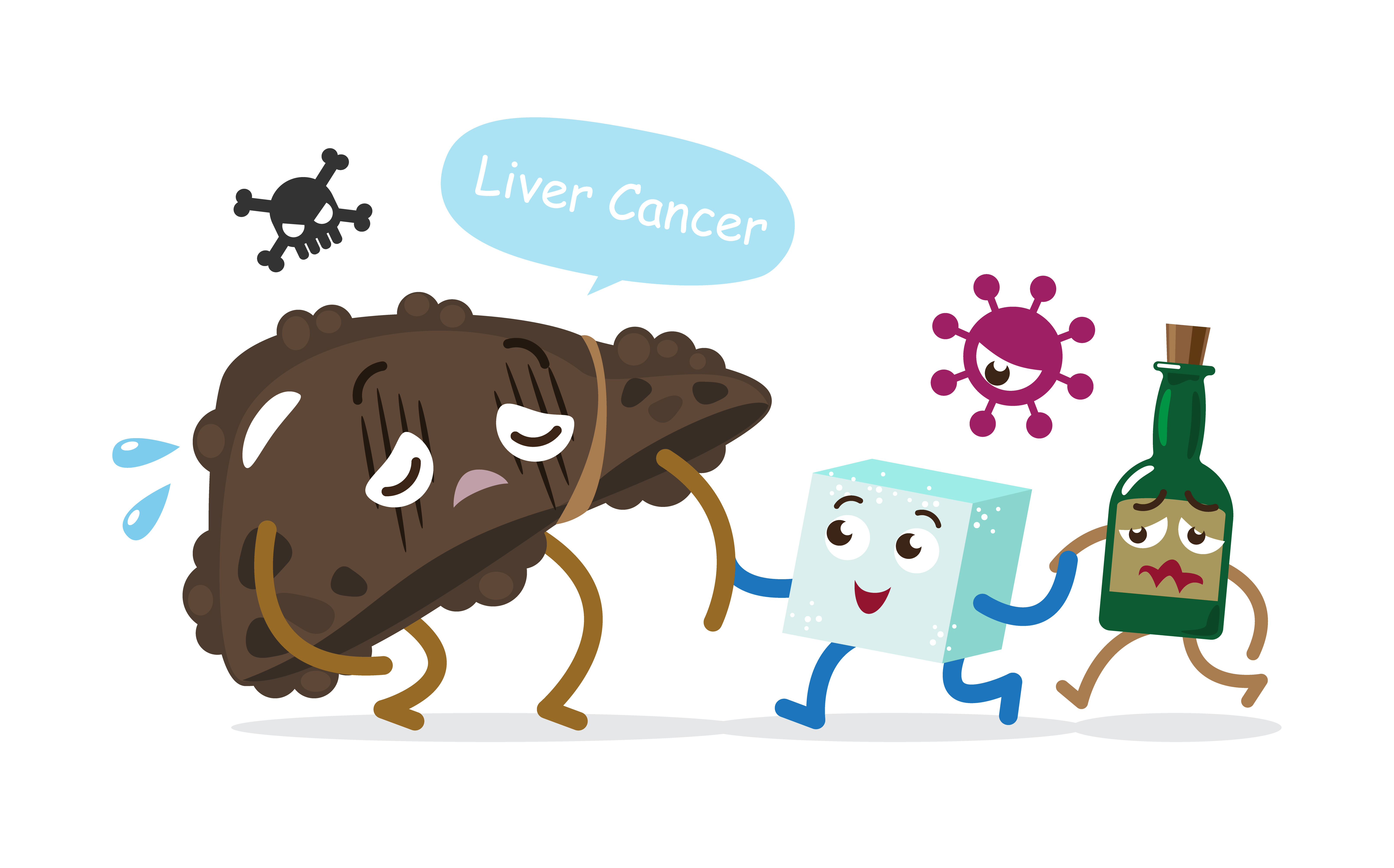Liver Cancer Awareness Month 2025: Insights from BMC Series Journals
Published in Cancer, General & Internal Medicine, and Public Health

Liver Cancer Awareness Month is celebrated each year in October to create public awareness about liver cancer, its symptoms, risk factors, and prevention methods. According to the World Health Organization (WHO), liver cancer ranks among the top three causes of cancer-related deaths globally, responsible for more than 800,000 deaths each year. This year’s campaign “Liver Cancer Doesn’t Discriminate,” serves as a reminder that liver cancer can affect anyone, regardless of age, gender, or background and highlights the importance of liver health in everyday life.
In this blog, we spotlight recent publications from the BMC Series journals, including BMC Cancer, BMC Gastroenterology, and BMC Psychiatry, that explore how metabolism, lifestyle, and mental wellbeing influence the occurrence and recurrence of liver cancer.
BMC Cancer – Basal metabolic rate shapes the development and progression of hepatocellular carcinoma
Hepatocellular carcinoma (HCC) is one of the most common types of primary liver cancer. A study published in BMC Cancer explores how the basal metabolic rate (BMR) influences the development and progression of HCC. Using a customized animal model, the researchers compared two lines of laboratory mice divergently selected for BMR. When liver cancer was chemically induced, the high-BMR mice developed tumors faster, showed greater disease progression, and had larger, more active livers than their low-BMR group.

The study suggests that a genetically determined high BMR may put extra stress on liver cells, activating certain metabolism-related genes that can drive tumor formation. It also highlights how biological factors, such as genetics, and environmental, such as diet and nutrient intake shape cancer risks. The study further reinforces the importance of maintaining metabolic health through balanced nutrition, exercise, and routine check-ups, to reduce the risk of liver cancer.
BMC Gastroenterology – Liver cancer risk and changes in lifestyle habits after successful hepatitis C virus therapy post-DAA)
Hepatitis C virus (HCV) infection is the leading cause of chronic liver disease, fibrosis, and cirrhosis conditions that can eventually lead to hepatocellular carcinoma. The introduction of direct-acting antiviral (DAA) therapy has revolutionized treatment by curing most cases of HCV. However, a recent study published in BMC Gastroenterology reveals that post-cure lifestyle habits can affect long-term outcomes.

In this questionnaire-based study, researchers assessed individuals who had been cured of HCV using DAA combinations to understand how their daily habits changed post-treatment. Participants who become more relaxed about their health and shifted to unhealthy habits such as alcohol consumption, gained weight, and had a sedentary lifestyle were observed having slightly increased risk of liver-related complications, even after the virus was cleared.
The authors emphasized the importance of lifestyle counseling and regular monitoring for these patients after HCV treatment. The prevalence of obesity and low physical activity among the cohort also highlights the need for targeted prevention strategies. This study highlights that liver health requires lifelong care. Staying active, eating well, avoiding alcohol, and attending follow-ups are essential for preventing disease recurrence.
Cancer patients often experience chronic stress as they navigate diagnosis and treatment, leading to insomnia, anxiety, and emotional strain. A recent study published in BMC Psychiatry explored how chronic stress affects survival outcomes in patients who had undergone curative treatment for HCC.

The researchers developed an innovative Chronic Stress Index (CSI) combining three measures - hair cortisol concentration (a biomarker of long-term stress), a Stress Score derived from physiological readings, and the Perceived Stress Scale (PSS-10) questionnaire. Using this index, they categorized patients based on their stress levels and compared disease-free survival (DFS) and overall survival (OS). The results showed that patients with higher CSI scores had significantly shorter DFS and OS compared to those with lower stress levels. Chronic stress weakens the body’s immune system, disrupts hormone balance, and promotes inflammation - all of which can lead to cancer recurrence.
By recognizing stress as a clinical factor, healthcare professionals can provide personalized psychological support, helping patients strengthen both their physical and emotional recovery. This study shows that caring for emotional wellbeing through counseling, mindfulness, and community support can profoundly enhance recovery and quality of life for cancer patients.
Reflections and the Road Ahead
The evidence from recent studies published in BMC Series journals reinforces a powerful message: liver health is a lifelong responsibility. Understanding how our body functions is vital for prevention; maintaining healthy habits demands daily commitment; and caring for mental wellbeing is part of medical care. Strengthening awareness, early detection, and emotional support can help reduce the burden of liver cancer and promote collective wellbeing.
Follow the Topic
-
BMC Psychiatry

This is an open access, peer-reviewed journal that encompasses a wide range of topics, including psychopharmacology, psychotherapy, and psychosocial approaches to psychiatric disorders, as well as genetics, pathophysiology, and epidemiology research.
-
BMC Gastroenterology

This is an open access, peer-reviewed journal that considers articles on all aspects of the prevention, diagnosis and management of gastrointestinal and hepatobiliary disorders, as well as related molecular genetics, pathophysiology, and epidemiology.
-
BMC Cancer

This is an open access, peer-reviewed journal that considers articles on all aspects of cancer research, including the pathophysiology, prevention, diagnosis and treatment of cancers.
Related Collections
With Collections, you can get published faster and increase your visibility.
The future of gastroenterology: interdisciplinary perspectives
BMC Gastroenterology is calling for submissions to our Collection on the future of gastroenterology: interdisciplinary perspectives.
As we advance into an era of personalized medicine and integrated care, interdisciplinary approaches are becoming increasingly vital in understanding and addressing the complexities of gastrointestinal diseases. This Collection seeks to explore the interrelationship of gastroenterology with various disciplines, including nutrition, microbiology, immunology, and advanced imaging technologies, highlighting the collaborative efforts that are shaping the future of this field.
The significance of interdisciplinary collaboration in gastroenterology cannot be understated, as it paves the way for solutions to longstanding challenges. Recent developments, such as the use of artificial intelligence in diagnostic imaging and the exploration of the gut microbiome's role in systemic health, have underscored the need for a more integrated approach to patient care. Such developments not only enhance our understanding of gastrointestinal diseases but also open up new avenues for therapeutic interventions, ultimately improving patient outcomes and quality of life.
As research in gastroenterology continues to expand, we anticipate remarkable developments in the coming years. Future studies may lead to the development of novel biomarkers for disease prediction, more targeted therapies based on individual genetic profiles, and improved methodologies for early detection and intervention. This ongoing exploration will likely result in a more holistic understanding of gastrointestinal health and disease, fostering a new paradigm in patient-centered care.
We encourage submissions on a wide array of topics, including but not limited to:
Interdisciplinary approaches in gastroenterology
Emerging trends in gastrointestinal research
Developments in hepatology and liver health
Technology and its impact on gastroenterology
Systemic health research in gastrointestinal disorders
The role of nutrition in gastrointestinal health
Innovations in gastrointestinal imaging techniques
The gut-brain axis and its implications for mental health
Microbiome research and its impact on disease management
Personalized medicine in gastroenterology
All manuscripts submitted to this journal, including those submitted to collections and special issues, are assessed in line with our editorial policies and the journal’s peer-review process. Reviewers and editors are required to declare competing interests and can be excluded from the peer review process if a competing interest exists.
Publishing Model: Open Access
Deadline: May 28, 2026
The gut microbiome: role in liver health and disease
BMC Gastroenterology is calling for submissions to our Collection on The gut microbiome: role in liver health and disease. The gut microbiome has emerged as a critical player to maintain liver health and the pathogenesis of liver diseases. The intricate relationship between gut microbiota and liver function, often referred to as the gut-liver axis, highlights how changes in microbiota composition can influence liver metabolism and overall hepatic health. Recent developments in this field have revealed that dysbiosis, or microbial imbalance, may contribute to conditions such as cirrhosis, alcoholic liver disease, metabolic dysfunction-associated steatotic liver disease (MASLD), hepatitis, and even liver cancer, underscoring the importance of understanding this complex interplay.
In addition, recent research shows the implications of gastrointestinal pathogenicity and the exacerbation of severity/outcomes in existing chronic liver disease. Mechanistic studies featuring host susceptibility related to gut microbiome alteration in liver disease can be submitted.
Investigating the role of the gut microbiome in liver health is essential for developing novel therapeutic strategies and interventions. Recent developments have identified specific microbial signatures associated with liver diseases, paving the way for potential diagnostic and prognostic tools. Moreover, interventions such as probiotics and dietary modifications have shown promise in improving liver health outcomes by restoring microbial balance. Future research could unveil novel biomarkers for early detection, elucidate the mechanisms underlying microbial influences on liver pathology, and refine therapeutic strategies targeting the microbiome.
Topics of interest include, but are not limited to:
•The gut-liver axis and liver health
•Interactions between the gut microbiome and liver immunology
•Microbial metabolites and their effects on liver function
•Role of gut microbiota in cirrhosis
•Microbial signatures in viral hepatitis and liver cancer
•Gut microbiota in alcoholic liver disease and MASLD
•Gut-liver axis in autoimmune, cholestatic, hereditary and other rare liver diseases
•Gut microbiome modulation as a therapeutic strategy
•Probiotics and liver disease management
•Environmental impact in gut-liver axis
•The impact of diet on the gut-liver axis
•Fecal transplantation for liver diseases
All manuscripts submitted to this journal, including those submitted to collections and special issues, are assessed in line with our editorial policies and the journal’s peer review process. Reviewers and editors are required to declare competing interests and can be excluded from the peer review process if a competing interest exists.
Publishing Model: Open Access
Deadline: Mar 18, 2026





Please sign in or register for FREE
If you are a registered user on Research Communities by Springer Nature, please sign in